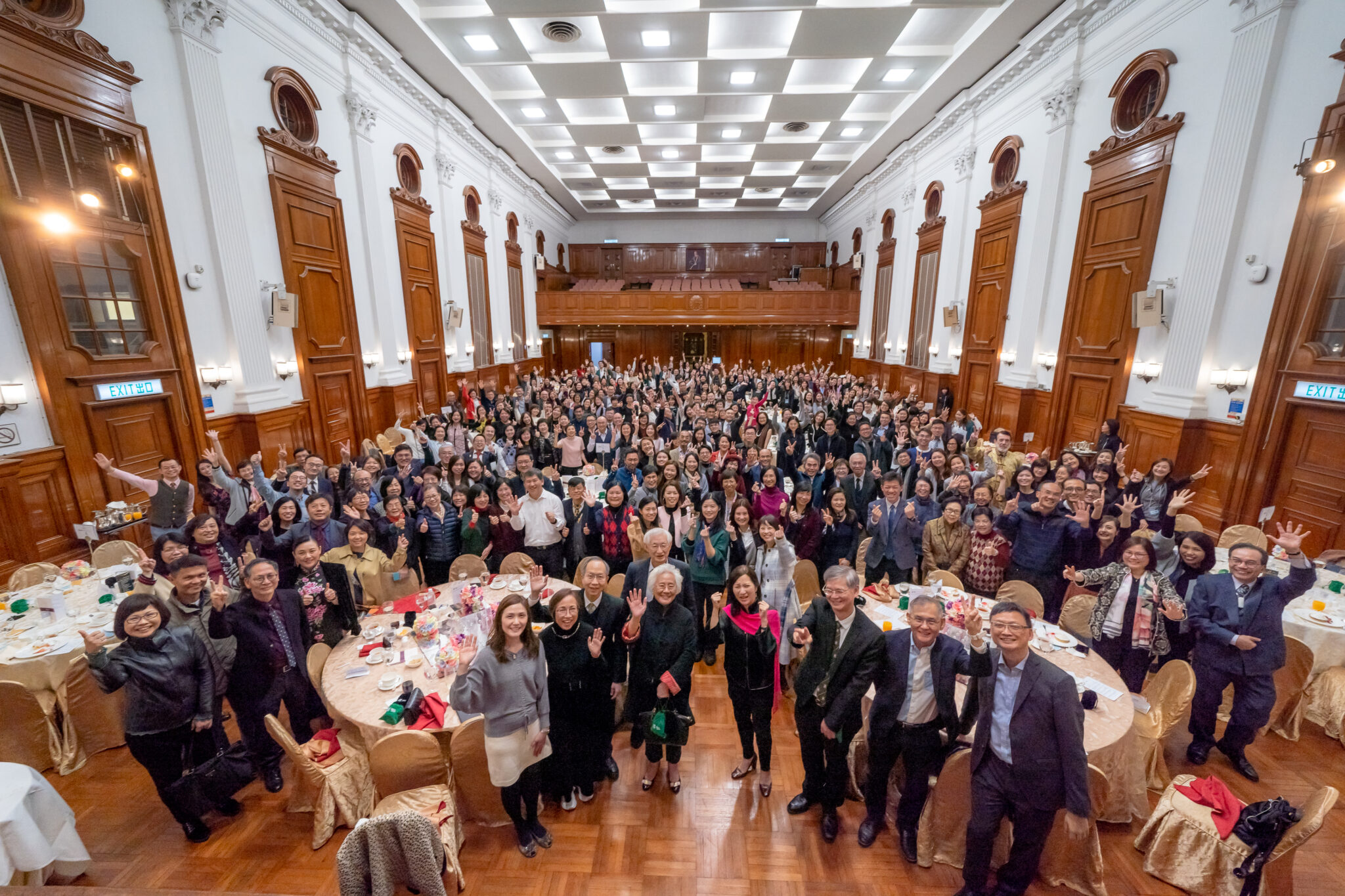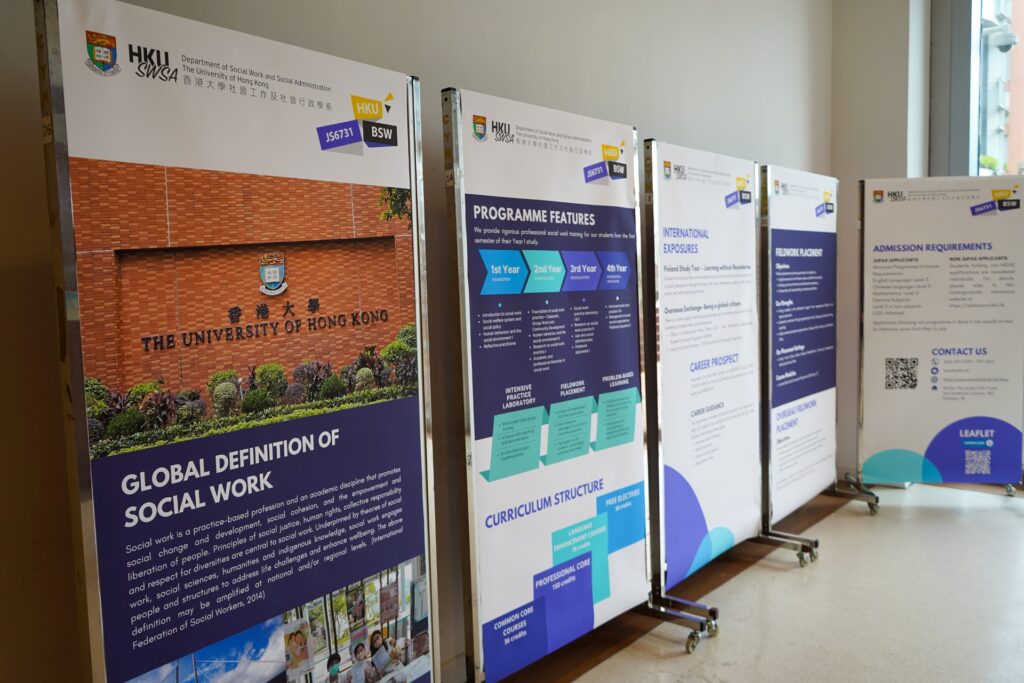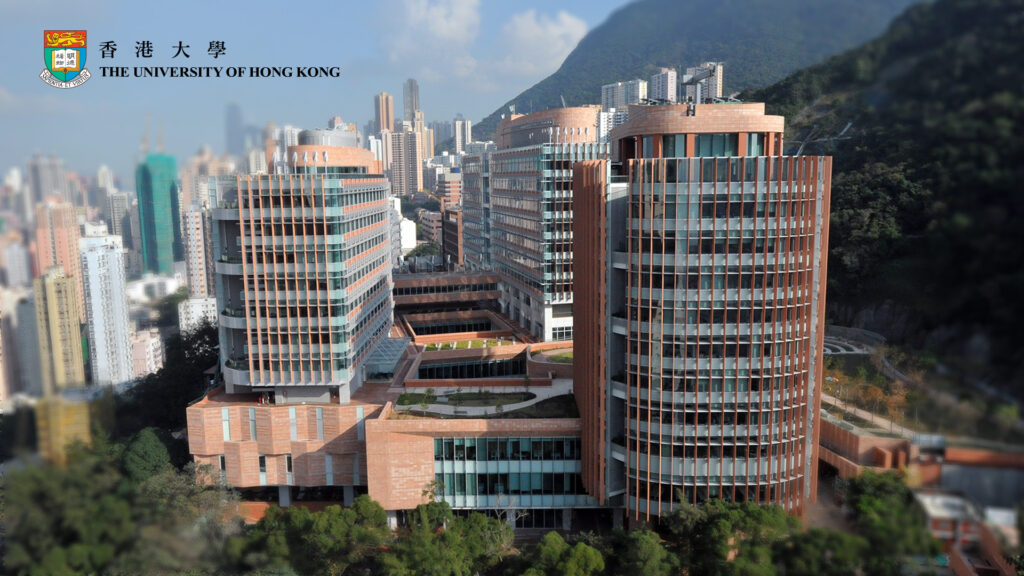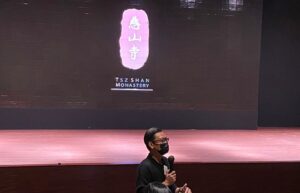MSocSc (Counselling)
Director’s Message
Assoc. Prof. Paul W.C.
WONG D.Psyc.(Clinical), Reg.Clin.Psyc (Australia)., RCP(HKPS), Ccoun&ACounS(HKPCA), FHKPsS, FHKPCS, MAPS
Thank you for browsing our Master of Social Sciences (Counselling) website and for spending your precious time getting to know us better. It is such a pleasure to share our vision with you. Our teaching team is passionately dedicated to bringing counselling to the wider community so that we can have a caring, compassionate, equitable, harmonic, and inclusive global city.
For me personally, I count having the knowledge, skills, and opportunity to work with vulnerable people as one of the greatest blessings of my life. Having the privilege of listening to people’s innermost voices and learning from troubled minds has been the most treasured experience of my existence. In addition, being able to bring happiness and solace to the wider community in Hong Kong and elsewhere is an astonishing journey for us as allied health professionals.
Our teachers are all believers in building a “Community of Inquiry” in the learning of counselling (ref). With the tremendous efforts of the previous programme directors, lecturers, supervisors, graduates, and administrative colleagues, we have developed a community of inquiry in counselling and community care. Our community creates a learning ecology that allows us to match and tackle the needs of people living in this complex society.
Since 2002, our student population has ranged from social workers and teachers to administrative and medical personnel such as executive officers, human resource managers, doctors, nurses, physiotherapists, and occupational and speech therapists. Apart from the diversity in our students’ backgrounds, our teachers are also multidisciplinary, consisting of clinical psychologists, educational psychologists, family therapists, clinical social workers, play therapists, and hypnotherapists, all of whom are practitioners in the field of counselling.
If you are prepared to take up these challenges wholeheartedly and passionately, and are committed to join with us on the journey to start becoming a more self-compassionate person gradually gaining more compassion for your families, friends, and social networks, we welcome you to enlist in our community of inquiry in counselling. We need you when you are ready!
Objectives
To equip students for acting as the first line of help, both at work and in their personal lives, for people in need of support before they develop more severe mental health problems.
To add to the resources of practitioners in human services who find themselves in need of further training in the counselling process.
Learning Outcomes
After successful completion of this programme, students should be able to
1. Value and attitude
- respect the dignity and civil rights of individuals with whom they interact in their professional practice
- demonstrate their interest, enthusiasm and ongoing commitment to practice, research and continued education in counselling and related fields
2. Ethics
- consider and adhere to the code of ethics for counsellors regarding delivery of direct counselling services and research practice
- recognize the limit of their own practices and provide only those counselling services for which they are competent by training and/or experience
- raise the level of self-awareness and personal development, and gradually develop a personal style of counselling within the boundaries of professional and ethical practice
3. Professional knowledge
- demonstrate a clear understanding of important concepts, theories and principles that constitute the discipline of counselling
- integrate counselling theories and models into practice and develop counselling skills
- use a range of research and learning strategies to acquire and apply new knowledge and skills to improve practice
- use the professionally derived knowledge and the most effective interventions for those with whom they are working
4. Professional practice
- select appropriate assessment procedures and justify their application and interpretation
- explain and begin to apply the up-to-date interventions learnt from specialist practitioners in areas of studies of their own choice
- critically evaluate the consequences of interventions and if necessary, develop alternative courses of action in consultation with the client, professional colleague or supervisor
Who will benefit from the programme
The Master of Social Sciences in Counselling is a self-funded two / three year part-time postgraduate programme for professionals in the human services, such as social workers, teachers, managers, human resources personnel, medical personnel like doctors, nurses, physiotherapists, occupational therapists, speech and language therapists and other related professionals who are interested in counselling.
Recognitions
Over the years, some of our graduates from the present programme have become members of the Hong Kong Professional Counselling Association.
The MSocSc (Counselling) completed at HKU has been evaluated and recognised by the World Education Services as equivalent to a Master’s degree in the United States.
Depending on individual circumstance (e.g., major in psychology, clinical experience), graduates are able to obtain professional registration or membership in several overseas countries such as the United Kingdom and Australia.
Objectives
To equip students for acting as the first line of help, both at work and in their personal lives, for people in need of support before they develop more severe mental health problems.
To add to the resources of practitioners in human services who find themselves in need of further training in the counselling process.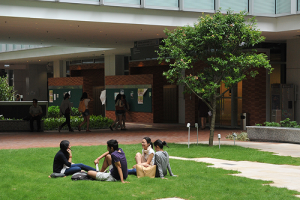
Learning Outcomes
After successful completion of this programme, students should be able to
1. Value and attitude
- respect the dignity and civil rights of individuals with whom they interact in their professional practice
- demonstrate their interest, enthusiasm and ongoing commitment to practice, research and continued education in counselling and related fields
2. Ethics
- consider and adhere to the code of ethics for counsellors regarding delivery of direct counselling services and research practice
- recognize the limit of their own practices and provide only those counselling services for which they are competent by training and/or experience
- raise the level of self-awareness and personal development, and gradually develop a personal style of counselling within the boundaries of professional and ethical practice
3. Professional knowledge
- demonstrate a clear understanding of important concepts, theories and principles that constitute the discipline of counselling
- integrate counselling theories and models into practice and develop counselling skills
- use a range of research and learning strategies to acquire and apply new knowledge and skills to improve practice
- use the professionally derived knowledge and the most effective interventions for those with whom they are working
4. Professional practice
- select appropriate assessment procedures and justify their application and interpretation
- explain and begin to apply the up-to-date interventions learnt from specialist practitioners in areas of studies of their own choice
- critically evaluate the consequences of interventions and if necessary, develop alternative courses of action in consultation with the client, professional colleague or supervisor
Who will benefit from the programme
The Master of Social Sciences in Counselling is a self-funded two / three year part-time postgraduate programme for professionals in the human services, such as social workers, teachers, managers, human resources personnel, medical personnel like doctors, nurses, physiotherapists, occupational therapists, speech and language therapists and other related professionals who are interested in counselling.
Recognitions
Over the years, some of our graduates from the present programme have become members of the Hong Kong Professional Counselling Association.
The MSocSc (Counselling) completed at HKU has been evaluated and recognised by the World Education Services as equivalent to a Master’s degree in the United States.
Depending on individual circumstance (e.g., major in psychology, clinical experience), graduates are able to obtain professional registration or membership in several overseas countries such as the United Kingdom and Australia.
Apply for Admission
Applications are now open
The curriculum shall extend over (a) not less than two academic years for the part time two-year study, or (b) not less than three academic years for the part-time three-year study, inclusive of intervening vacation.
Candidates are required to complete 66 credits, including 5 compulsory courses (6 credits each), and 3 elective courses (6 credits each) or 1 elective course (6 credits) with a dissertation (12 credits), a skills training laboratory (6 credits each) and a practicum (12 credits) that includes a practice-based project report. Elective courses are so designed that they can provide a focused study in one of three service settings: welfare, education, and health care. By selecting a particular combination of courses, candidates may (1) specialize in one stream from these three service settings; or (2) choose a more broad-based curriculum; or (3) choose to complete 1 elective course with a dissertation (equivalent to two courses) if candidates are interested in advancing their research skills.
Candidates can take a maximum of one elective course from the Master of Buddhist Counselling programme. Teachers from the Master of Buddhist Counselling programme may also serve as the co-supervisor in the Capstone Experience Courses if the area of study is relevant. The selection of cross-listed courses and co-supervision of Capstone Experience Courses shall be subject to the approval of the Programme Director/Chairman of the two respective programmes.
(A) Compulsory Courses
Social workers, teachers, nurses and counselors are guided by theories, research and practice wisdom in their work. It is important for students to be able to appraise, utilize, participate and contribute to research. In order to build evidenced and indigenous practice knowledge appropriate to local settings, this course aims to introduce students to principles and procedures of evidence-based practice. Specifically, it aims to help students in tracing research foundations in clinical practice, examining critical issues associated with evidence-based practice, accessing and evaluating new information related to practice and ultimately evaluating critically their practices. Through carrying out a mini-practice research as ongoing assignments, the students are expected to equip with hand-on experiences in planning, designing, implementing research and presenting its findings.
This course examines factors affecting human development through an exploration of the normal patterns of growth from infancy to old age. Individual, social, and familial conditions affecting growth at different stages in the life cycle will be studied, together with related problems of adaptation and adjustment, with particular foci on current thinking in the field of developmental psychology.
This course provides a broad exposure to both theory and practice in the understanding of mental disorders. A wide array of types of mental disorders will be examined. Important themes will be emphasized such as the continuum in behavior from normal behavior to mental illness, issues in diagnosis and classification, and the diathesis-stress and nature-nurture models of abnormal behaviour.
This course surveys the major concepts and techniques in the field of psychometrics and provides students with some hands-on experience with commonly used tests. Topics covered include: the context of testing and measurement, the testing process, test standardization, reliability and validity, the nature of intelligence and its appraisal, personality assessment, special domain testing, occupational applications, and ethics in testing.
This course provides a theoretical foundation for the practice of counselling. Topics covered include the major approaches in counselling, counsellor dimensions, working with various clinical and non-clinical populations, professional ethics and limitations of counselling.
(B) Elective Courses*
* 1. Elective courses will be offered spanning from the summer semester in Year One to the 2nd semester in Year Two.
2. Not all elective courses will necessarily be offered in a given year.
SOWKXXXX** Subject to the University’s approval
Emotionally focused therapy (EFT) is an attachment based approach that utilizes the power of empathic attunement and experiential interventions to facilitate a felt sense of security with oneself and others. In the context of individual therapy in EFT, the therapist tunes into the emotion processes of the client and works to facilitate corrective emotional experiences. These new, healing emotional experiences build capacities in regulating emotions and shape a sense of trust in one’s worthiness and competence.
This course provides a theoretical overview of the EFT approach in the context of individual therapy (EFIT) with an emphasis on the experiential practice of empathic attunement and EFT interventions. Students will learn the roadmap of EFT, apply practical interventions on how to attune to the here-and-now emotions, and facilitate processes that promote more secure and flexible models of self and others. Neuroscience is introduced to help students to understand its role played in emotional changes.
Assessment: 100% coursework
Human behaviour is heavily influenced by family upbringing and socialization. This course, based on a marathon experiential training mode, aims to help students to achieve an understanding of their family. Virginia Satir’s concepts of family rules, communication patterns, family mapping and self-esteem will be used to guide students through a process of self-discovery. Active participation will be essential.
Assessment: 100% coursework
The course introduces students to the Beck’s cognitive-behaviour therapy model in working with people with depression and anxieties. A case process approach will be adopted to provide a stage-by-stage and step-by-step understanding of the theory and practice of Beck’s CBT. Other CBT models for working with people with psychosis, OCD, pathological gambling, substance abuse and etc. will also be discussed in class.
Assessment: 100% coursework
The objective of the module is to introduce the student to the principles and practice of play therapy and its application to the counseling and psychotherapy for children, adolescents and families. At the end of the course, the students will have an introduction of the history and development of play therapy, an understanding of various theoretical models of play therapy, rationale for the use of play in therapy, and phrase of the client’s progress in play therapy. Practice material will be provided including how to development therapeutic rapport, conduct a play based assessment, setting up of a playroom and the selection of therapeutic play materials. Best practice tips on engaging the client, recording keeping and other ethical issues will be discussed.
Assessment: 100% coursework
This course offers an understanding of the developmental characteristics, needs and struggles of students in schools (children and adolescents). To understand the counselling process and acquire necessary skills in offering counselling to students are the main foci, such that students may be helped to cope better with their school life.
This course introduces the various macro and micro intervention approaches in working with disadvantaged individuals who are users of social services in Hong Kong. Through a systems perspective, students will have the opportunity to examine various intervention approaches in helping disadvantaged groups, such as new arrivals, elderly people, at-risk youth, and mentally and physically handicapped persons to deal with their intra-personal, interpersonal and environmentally-induced difficulties. The course emphasizes the integration of micro and macro intervention approaches.
Counselling approaches used in health care, such as crisis intervention, grief work, cognitive behavioural intervention, support groups, art therapy, psycho-education skills, bereavement counselling, pastoral care and peer counselling, will be examined. Students will be provided with experiential training on skills/ techniques in working with patients in hospitals and in the community.
This course examines the drug scene in Hong Kong and gives an overview of the problem of substance abuse in society. The different theoretical conceptualizations of substance abuse and theories of addiction are then reviewed as a prelude to devising intervention approaches to help drug-addicted persons.
Positive Psychology emphasizes the discovery and cultivation of human strengths and potential for a flourished life, and strength-based interventions include counseling and therapy models that foster psychological well-being and reduce distress and symptoms in clients. This course critically reviews the theory and practice of positive psychology, including the study of happiness, character strengths, optimism, resilience, compassion, meaning, goals, flow, creativity and hope and their relevance to psychological health and psychotherapy, as well as strength-oriented interventions which include mindfulness-based, compassion-based and valued-based models. The cultural relevance of Positive Psychology and strength-based interventions will also be examined. Assessment: 100% coursework
This course provides an overview of the theories and practice of group counselling approaches. Applications include working with families, children, the elderly people, and medical/psychiatric patients. Cultural issues, current research and developments in group counselling will also be discussed.
This course introduces students to the philosophy and practice of Art Therapy, and how Art Therapy activities can be modified and used with potential clients under careful working guidelines. Students will also experience different art activities/philosophies, which are designed according to the various needs of potential clients. Lectures, participation in group workshops, and video and case presentations will form a part of this course.
This course gives an overview of the historical development and domain of hypnosis, as well as contemporary approaches in hypnosis. A particular emphasis is placed on the fundamentals of hypnotherapy where particular skills will be of use in the counselling process. Lecture topics include the art of hypnotizing, styles of hypnotic suggestion, clinical applications, professional ethics and limitations of hypnotherapy.
This course provides an overview of Motivational Interviewing (MI), an evidence-based counselling strategy for promoting behavioural change. MI originates from treating alcohol dependence, and was further extended to other settings, including health care, the criminal justice system, correctional and education, to mention just a few. Over 30 decades of evolution, MI has spread widely across many settings and cultures. MI was developed from clinical observation, rather than theory. However, there are numbers of social psychology and counselling theories that can be used to explain the underlying mechanism of motivating strategies in the process of motivational interviewing, such as cognitive dissonance theory, self-determination theory, etc. Students are required to learn different social psychology theories and counselling theories to deconstruct MI. In addition, multifaceted unfolding of the concepts of addiction and recovery-oriented approach toward addiction treatment will be covered. Students can be equipped with not only the knowledge and conceptual framework of motivational interviewing, but also practical experiences through group exercises and role-play. Active participation is expected in order to cultivate mutual learning communities and achieve better learning outcomes. Assessment: 100% coursework
SOWK7010 Bowen family systems theory and clinical applicationsThis course aims to walk with students through the latest knowledge on counselling practices individuals with mental health issues and the promotion of wellbeing. It will provide you with the evidence- and experienced-based knowledge of non-pharmacological approaches and practical skills relevant to counselling practices You will be guided to see how these practices are not only applicable to counselling in mental health context but also to working with people coping with other issues and challenges in life. Assessment: 100% coursework
This course aims to walk with students through the latest knowledge on counselling practices individuals with mental health issues and the promotion of wellbeing. It will provide you with the evidence- and experienced-based knowledge of non-pharmacological approaches and practical skills relevant to counselling practices You will be guided to see how these practices are not only applicable to counselling in mental health context but also to working with people coping with other issues and challenges in life. Assessment: 100% coursework
This course aims to introduce the basic theories and practices in coaching. Students will be able to distinguish coaching from other learning and development approaches such as mentoring, counselling, consulting, training, facilitating etc. Various theoretical approaches to coaching will be covered. This course also encourages students to evaluate the various coaching models and develop their own coaching model to be applied in their own coaching practice. The emphasis is also on using coaching as a management tool and conversational tool to enhance performance at work for higher motivation and retention. The topic on cross cultural coaching is also a relatively imminent area for further research.
This course will cover the most representative psychotherapies of such kind, including mindfulness-based psychotherapies, acceptance and commitment therapy, and compassion-focused therapy. All these therapies are transdiagnostic capable of treating different mental disorders and are evidence-based with proven treatment efficacy. They have a very different understanding of the nature of psychopathologies and human suffering from the traditional psychotherapies. Their theoretical frameworks, treatment principles and strategies, case conceptualization, and intervention skills will be demonstrated in this course, and the commonalities and differences among these therapy models will be reviewed. The benefits of practicing these therapies on the therapist and the therapeutic relationship will also be discussed. The students learning these contemporary psychotherapy models are expected to have advanced personal growth and gains in psychological well-being as well.
Assessment: 100% coursework
This course will teach the fundamentals of Bowen family systems theory (or Bowen theory) and its application to clinical work. Bowen theory is one of the most well-established family therapy approaches. It views the family as an emotional unit and an emotional system, regulated by emotional processes found also in other living organisms. It adopts systems thinking (versus linear thinking) to viewing human behaviour, thus seeing symptoms not as the pathology of the individual, but as reflection of the dysfunctions of a family system.
Treatment is aimed at ameliorating the dysfunctional family relationship patterns and interaction processes.
Students will learn to make multigenerational and systemic assessment of families, to take a broad view, to practice objectivity and neutrality, to identify multigenerational relationship patterns and to work towards differentiation of self, a crucial factor for resilience, in their counselling work. Instructions on the theoretical concepts will be supported with ample illustrations of case examples with individual, couples and families facing problems such as eating disorder, marital difficulty, depression, and child behaviour/emotional problems. There will be videos, case presentations and discussions, and practice of questioning.
Assessment: 100% coursework
This course brings together cutting-edge knowledge and discussions related to the online world, its impact on digital generations’ health and mental health, and the use of technology in psychosocial services both in the unique local and international contexts. Students will learn essential theories and research of cyberpsychology and online counselling. The content includes basic principles, assessment and evidence-based practices of professional counselling and psychosocial interventions for individuals and groups over the Internet, focusing on understanding and practising online counselling and crisis intervention with high-risk groups. Ethical practices are highly emphasized throughout the entire course. Our goal is to help students with background training in “human services (e.g., counselling, social work, academic advising, support for caregivers) to be capable of helping people with various psychosocial needs or mental health conditions and distress through both synchronous and asynchronous e-platforms.
Assessment: 100% coursework
Human-Animal Interactions is a rapidly emerging field. Human services providers realized the power of the unconditional love offered by our non-judgmental animal partners to hance the well-being of people interact with those animals. As the number of people in needs such as special educational needs (SEN), dementia, and mixed mood disorders, is increasing, the number of those who are non-responsive to the more traditional service formats is also increasing. Hence, animal assisted interaction (AAI) has become one of the most welcomed non-traditional interventions especially for those under-served or non-responsive individuals in the society. As one of the pioneering courses about AAI being taught at the post-graduate level, this course provides a comprehensive overview of the major theoretical orientations in AAI with a major focus on its application in counselling of people with common mental health needs. It aims to give students an appreciation of the general issues, problems encountered, and related ethical issues of applying AAI in the counselling process. It covers topics such as the basics of the human-animal relationship, ethics and professionalism, limitations of AAI etc. Students will also be introduced to the basic psychology and behaviour of animals, and the training philosophy since these will be incorporated into the design and practice of AAIs. Student learning will be facilitated by lectures, seminars, case studies, experiential exercises, group projects, and the completion
Assessment: 100% coursework
(C) Skills Training (Compulsory)
Through experiential learning this course provides training in relationship building strategies and skills related to individual and group counselling.
This laboratory provides training on basic relationship building strategies and methods. Counselling relies on an establishment of therapeutic relationship. Characteristics and dimensions related to such counsellor-client relationship will be introduced, and strategies and methods for building rapport will be practiced in the laboratory setting. Further, the course will also cover basic skills related to case and group counselling. Teaching is done via an experiential learning approach. Students are required to participate actively in class and complete practice assignments.
(D) Practicum (Compulsory)
Students are encouraged to find and secure their own fieldwork placement for the practicum training.
All students will have to be engaged in a total of 250 hours of clinical work, and to complete a practice-based project report of no more than 10,000 words. A practicum teacher will be assigned to supervise the student’s clinical work and to facilitate his/her completion of the practice-based project report. The report should essentially be an evaluation of the clinical work performed by the student. Individual and group supervision will be provided. Students must hand in their reports not later than June 30 of the same year when the practicum is undertaken.
Prerequisite: Students who have completed and passed the following courses
SOWK6158 : Critical issues in human development
SOWK6159 : Abnormal psychology
SOWK6160 : Assessment and testing
SOWK6161 : Theories and practices in counselling and professional ethics
SOWK6170 : Skills training laboratory
Assessment: 100% coursework to take the practicum and practice-based project report course.
(E) Dissertation (Optional)
The dissertation is offered to students who have proven record to show their ability to conduct research. The dissertation shall be a critical study that demonstrates the application of sound research methodology to the investigation of problem(s) relevant to the field of counselling. The proposed topic of investigation has to be substantially different from the issues or problems covered in the practice-based project report (SOWK6171). The dissertation option is subject to approval of the Head of Department and relevant dissertation supervisor. The dissertation must represent a student’s individual work and should not exceed 20,000 words in length. The title of the dissertation shall be submitted for approval not later than March 31 of the same academic year of study. The dissertation shall be presented by not later than August 1 of the same academic year of study.
Enhancing performance, extending to new levels
Our students have very diverse and colourful backgrounds. Many of them are teachers; social workers; administrative personnel such as executive officers, human resource managers, corporate managers or trainers; church pastors; medical and health professionals such as doctors, nurses, physiotherapists, occupational and speech therapists, psychologist assistants; volunteer counsellors, research assistants, legal practitioners; police and probation officers; personal coaches and trainers and others.
Our programme provides students with unique opportunities to strengthen their knowledge and skills in counselling; in turn, they are better equipped to meet the challenges in their existing positions or voluntary organisations where they are affiliated with.
In career terms, graduates may:
- Remain in their current positions with or without newer levels of responsibilities;
- Acquire new jobs but in similar field of human services; or
- Get promoted
Becoming a professional counsellor
When we conducted the “MSocSc (Counselling) Graduates Destination Survey” in 2012, 45 respondents who graduated in the years between 2009 and 2011 participated and we noticed that:
- Approximately 65% set a goal to change their career to become a professional counsellor (paid or volunteer) when they enrolled to the programme; and
- Within this group, in about three years about 40% of the graduates were able to achieve the goal.
We want to highlight that the success seemed to be determined by four major factors: 1) having relevant counselling related experience in the past; 2) time taken in developing networks and making oneself known in the field of human services; 3) arranging ongoing supervision and support; and 4) public’s recognition of the role of counsellors in Hong Kong.
Counselling Unit
The Counselling Unit is co-organized by the BSocSc (Counsel) and MSocSc (Counsel) programmes, which plays role as Counselling Education Platform that enable the sharing of knowledge and skills through practice.
Our mission is to facilitate counselling trainees’ learning through practice and to address the importance of theory, research, and ethical practice. The Unit provides multilingual counselling services to the Hong Kong communities at an affordable cost in order to provide help to people in need of emotional and mental health support.
Through offering high-quality counselling services to the community, we wish to promote help-seeking behaviours among the general public for counselling services through an established platform with members of diverse expertise. Our teachers and trainees are from the programs of the Master of Social Sciences in Counselling and the Bachelor of Social Sciences, consisting of counsellors, family therapists, psychotherapists, play therapists, hypnotherapists and social workers.
About Us
We are a team of multidisciplinary practitioners from the Department of Social Work and Social Administration (SWSA), at The University of Hong Kong (HKU). Our teachers and trainees are from the programs of the Master of Social Sciences in Counselling and the Bachelor of Social Sciences in Counselling, consisting of counsellors, family therapists, psychotherapists, play therapists, hypnotherapists and social workers.






Community Services
Individual Counselling
Counselling in the Counselling Unit is designed to assist clients with personal and social concerns.

Emotional Support
Counsellor assists clients with emotional issues, including stress, anxiety, depression, loss and grief, relationship conflicts, sexuality, drug/alcohol abuse, life decisions, and so on. The process is to identify, clarify, and become proactive regarding the problems clients are facing.
Personal Growth
Counsellor works together with the client on challenges including education/academic problems, career development, retirement, and so forth, to promote personal growth and development. Client will participate proactively in the process including evaluation of life, goals, and tools/choices clients’ assembled to proceed in life.

Couple/ Family & Relationship Counselling
High quality material produced by Real Factory backed by support of our expert consultants to fulfil a whole range of applications in the market.
Group Counselling
The counsellor can provide facilitation to assist people who struggle with similar concerns and challenges to learn and explore new ways of tackling their issues. Topics that might be covered in group counselling might include personal/social, academic, lifespan challenges, career development, and so on.
Make an appointment
Call 3917 2984 or Text / Whatsapp +852 9227 3550
Sharing of knowledge and skills through practice
Counselling Fee
HK$300 / Session
Fee waive for: Recipients of CSSA; Senior citizens at or above 65 years old; or With proof of social worker’s request for fee waiver.
Learning & Sharing
Practical Training
Provide real-time learning opportunity for Bachelor’s and MSocSc (Counsel) students to observe the counselling process (with consent of all parties, including the client, the counsellor and the Unit) and to reflect on their experience, guided by their teacher.
Videotaping, with consent of the client, which facilitates well-rounded learning and skills enhancement.
Knowledge and skills sharing
Student participants are encouraged, in group and/or individual counselling, to link their experience with theories learned earlier and to share their feelings and thoughts critically, with the facilitation of teaching staff and Unit staff.
Practice-based Research
The Counselling Unit provides professional counselling to clients from the community, and this in turn produces quality information for further research.
Contact Us
Adress
Room 4.23, 4/F , The Jockey Club Tower, The Centennial Campus, HKU, HK
Telephone
(852) 3917 2984
Service Hours
Tuesday & Thursday :
4:15 PM – 8:45 PM
(Last Appointment at 7:30 PM)
Saturday : 9:15 AM – 3:45 PM
(Last Appointment at 2:30 PM)
counselu@hku.hk
Drop A Line
Grief and Post-traumatic Growth: A Cross-Regional Perspective on Pet Loss in Chinese Societies
- February 5, 2024
- Research, Teaching
This webinar brought together animal lovers, people with pet loss experiences, bereavement counsellors, and researchers to explore the emotional and psychological impact of pet bereavement across Chinese societies. Highlighting ongoing research from Hong Kong, Singapore, and Taiwan, we examined the relationship between pet loss and post-bereavement growth, focusing on key mediators such as resilience, social support, and professional interventions. Participants engaged in discussions about cross-regional research findings, the role of cultural factors, and how evidence can inform practices to support individuals through the grieving process that leads to growth and better appreciation of human-animal bond.
Keynote Speaker – Miss Winnie Yiu
Winnie Yiu is a counsellor and researcher specializing in community and clinical mental health. With a BSc in Psychology from Newcastle University and a Master of Social Sciences in Counselling from The University of Hong Kong, her research and counselling practice focus on areas such as juvenile delinquency, families with incarcerated individuals and human-animal interactions. In her current work, she explores the emotional impact of pet bereavement and post-bereavement growth, aiming to make mental health support more accessible, particularly for under-recognized and marginalized communities.
Moderator – Prof. Paul Wong
Professor Wong an accredited register clinical psychologist and an Associate Professor in the Department of Social Work and Social Administration at The University of Hong Kong. His recent research projects encompass various areas, including youth social withdrawal behavior, the utilization of animals in educational and psychological interventions, positive youth development among local and non-Chinese young individuals, and family caregiving for individuals with psychological issues and people incarceration. He serves as the Programme Director of the Master of Social Science (Counselling) and has received the Faculty of Social Science’s Research Output and Knowledge Exchange Awards in 2015 and 2020 and 2024, respectively.
Discussant -1 – Mr. Chen Huai-Enn (founder of Animal Social Work, Taiwan)
Mr. Chen is a social worker (LSW) from Taiwan, dedicated to integrating the fields of animal welfare and social work, focusing on groups that interact with animals, such as veterinarians and pet owners, addressing issues related to mental health, welfare, and violence within these communities. The hope is that social workers can bring animals into the horizon of knowledge and practice.
Discussant -2 – Dr. Camille Chan
Dr. Chan is a dedicated researcher specialising in veterinarians’ mental health, particularly the emotional impacts associated with their occupation. Dr. Chan is a guest lecturer at the City University of Hong Kong, teaching a mental health module to veterinary medical students. Dr. Chan also works as a research officer at HKU, focusing on a project that relating to caregivers of children with autism. Their research portfolio also encompasses the burnout and mental health of social workers, as well as the experiences of individuals coping with bereavement from suicide.
Learning

Emotion-focused Interventions, Hypnotherapy and Family Therapy are my elective courses in studying the Master of Social Science Counselling Program. I found them very useful in understanding how empathetic attunement, emotion schemes, hypnotic trance state, and family systems how affect individuals, couples and families. Not only does this knowledge increase my self-awareness, but helps others understand problems within the field of study
A. Lau

Practicum is valuable for integrating my knowledge into practice. I’m impressed by the individual and group supervision at that period of time.
Graduate
Personal growth

This programme taught me that in order to become an effective counsellor, I first needed to understand myself. Through examining myself through a counselling perspective, my capacity for understanding and forgiveness has grown. I try to view things through a different lens now, to examine underlying motivators and needs and to appreciate various perspectives.
D. Niederberger

The learning journey has not been easy; yet, it has been very rewarding. Overall, it has broadened my perspective in terms of how I see myself and other people. Additionally, my relationship with families and friends are now enriched. The faculty members and classmates are passionate and inspirational. I have learned a lot from them!
S.Doo

I’m currently a Year One part-time student of Master of Social Sciences (Counselling). To me, this course is a refreshing and rewarding journey. Not only have I gained a deeper understanding of the art and science of counselling through learning and practice, but I have also had a valuable opportunity to experience progressive personal growth. Additionally, I appreciate the passionate teaching and devoted efforts by all lecturers coming from different professional backgrounds and expertise. They have certainly widened my perspective and enabled me to develop insightful reflection upon various subjects. Most importantly, the numerous lecturers have taught me how to put evidence-based theories into ethical and effective clinical practice. Lastly, I treasure the love, friendships and joy brought to me which I have never expected from here before. I would like to express my gratitude to all my beloved friends and classmates whom have accompanied and supported each other through good and hard times.
A. Lau

This course in counseling has helped me grow personally and professionally. Great teachers and demanding workloads have led to fruitful learning experiences. I’m becoming more self-aware, sensitive, and happy.
O.Wang

Although I did not practise as counsellor after graduation, the self-awareness skills learnt from the course and the personal growth afterwards are considered as the most valuable.
Graduate
Being a reflective practitioner “ I love the way our lecturers facilitate us to think critical

I love the way our lecturers facilitate us to think critically and act ethically. We have an open environment to share our experience and ideas with classmates from a diverse background. The stimulation of thoughts through interaction has helped apply what I have learned in class to society.
T.T.Chan

I have enjoyed the process of doing the research, reading the articles, identifying the video clips and sifting through the materials in formulating our perspective. The process itself is rewarding and of course, there is no better acknowledgement than (a teacher’s name) feedback. Very much appreciated.
Graduate

Apart from being a barrister-at-law, I also run therapeutic groups on a voluntary basis for people who have difficulty in coping with the loss of their loved ones. Without the good counselling training offered by HKU Counselling Programme, I do not think I can be as effective as I am. Last but not least, the HKU MSocSc (Counselling) Programme is the best programme in Hong Kong.
S. Char
Second career

My life experience in my first career had been a major source of strength in my second career as a counsellor, especially when helping people with what life and career and relational issues. I feel I have grown a giantfoot in human understanding.
W. Cheung
| Programme Director | |||
|---|---|---|---|
| Wong, Paul W.C. | 黃蔚澄 | B.Soc.Sci.(Psych.)(Hons.), M.Psyc.(Clincal), D.Psyc.(Clinical), RegClinPsyc (Australia), RCP(HKPS), Ccoun&ACounS(HKPCA), FHKPCS, FHKPS, MAPS, Accredited Counselling Supervisor (HKPCA) | |
| Deputy Programme Director | |||
| Tang, Jessica P.S. | 鄧佩珊 | BA(English) CUHK; MSW, PhD HK; RSW | |
| Programme Advisors | |||
| Tse, Samson S.K. | 謝樹基 | PDOT(Dis) HKPU; PgDipSocSc Massey; MSc(Dis), PhD Otago, AFHKPCA, Certified Counsellor, Accredited Counselling Supervisor HKPCA | |
| Tsang, Sandra K.M. | 曾潔雯 | BSocSc, MSocSc, PhD HK; RSW; CPsych; RCP(HKPS), FHKPS, FHKPCA | |
| Programme Team Members | |||
| Wong, Paul W.C. | 黃蔚澄 | B.Soc.Sci.(Psych.)(Hons.), M.Psyc.(Clincal), D.Psyc.(Clinical), RegClinPsyc (Australia), RCP(HKPS), Ccoun&ACounS(HKPCA), FHKPCS, FHKPS, MAPS, Accredited Counselling Supervisor (HKPCA) | |
| Tang, Jessica P.S. | 鄧佩珊 | BA(English) CUHK; MSW, PhD HK; RSW | |
| Chong, Eddie S.K. | 莊兆鈞 | BSSc CUHK; MA Boston College; MS, PhD Maryland – College Park U | |
| Wan, Pauline Y.P. | 尹婉萍 | BSocSc(Social Work) CUHK; MSocSc(Family Counselling), PhD HK | |
| Muhammad Hafiz, B.Z.A. | BPsy James Cook U; MEd(Leadership and Policy Change) Monash U; PhD NTU; Clinical Member SAC | ||
| Chan, Tess T.C. | 陳憩晴 | BSW, MSocSc(Counsel) HK; RSW | |
| Chan, Hallie H.L. | 陳凱莉 | BSocSc(Psy) CUHK; MSocSc(Counsel) HK | |
| Choi, Charmaine S.M. | 蔡舒敏 | BA Melbourne U; MA(Guidance and Counselling) Poly U | |
| Siu, Yolina L.M. | 蕭諾汶 | MSc, PolyU, MSocSc (Counselling), HKU, PD (Applied Psychology) BU, Cert (Mindfulness Psychotherapy, QF Level 6), CCoun (HKPCA, BACP, CCPA) | |
| Practicum Coordinator | |||
| Chan, Tess T.C. | 陳憩晴 | BSW, MSocSc(Counsel) HK; RSW | |
| Honorary Teachers | |||
| Chan, Peggy C.Y. | 陳蘇陳英 | BSocSc HK; MEd Toronto; RSW; Accredited Counselling Supervisor HKPCA | |
| Cheng, Belinda Y. M. | 鄭恩明 | BA(Hons) Michigan U; MSc(Social Work) Columbia U; RSW | |
| Cheung, Ginette P.C. | 張貝芝 | BSc(Psychology); MSocSc(Couns); MA(Clinical Psychology); PsyD(Clinical Psychology) | |
| Chong, Eddie S.K. | 莊兆鈞 |
| |
| Chung, Catherine L.P. | 鍾麗萍 | BSc(Chemistry) HK; PgDip(Social Work) Poly U; MSW PhD HK | |
| Lee, Ester M.L. | 李明琳 | BSocSc CUHK; MSocSc(ClinPsych) HK | |
| Leung, Gracemary K.H. | 梁國香 | BA(Hons), PhD(Psycho) London; MSc (Clinical Psycho) Exeter; MBABournemouth | |
| Lo, Bibiana C.H. | 羅朝虹 | BSocSc, HKU; PgDip (Family-centred SocWk), Poly U; MPhil HK; RSW; Accredited Counselling Supervisor HKPCA | |
| Muhammad Hafiz, B.Z.A. | BPsy James Cook U; MEd(Leadership and Policy Change) Monash U; PhD NTU; Clinical Member SAC | ||
| Mok, Katy Y.M. | 莫沅雯 | BSocSc(Psychology) HKU; MBA HKUST; MSocSc(Counseling) HKU | |
| Powell, L.Y.M. Candice | 凌悅雯 | BA(Philosophy & Psychology), HKU; MA(Trauma Psychology), MSSc(ClinPsych ), Doctor of Psychology, CUHK | |
| Tang, Jessica P.S. | 鄧佩珊 | BA(English) CUHK; MSW, PhD HK; RSW | |
| Tang, Kelvin K.W. | 鄧國永 | BSW(Hon), DipSocWk Baptist U; MA(Social Work), PgDip (SocAdmin) HKPU; PhD SU; Accredited Counselling Supervisor HKPCA | |
| Tong, Anthony K.K. | 湯國鈞 | BSocSc, MSocSc HK; DipEd CUHK; DEd(CPsych) Toronto U | |
| Tong, Natalie | 唐靜思 | BA(Psychology) Notre Dame de Namur U; MSc(ClinPsych) San Jose State U; LMFT(AAMFT); Associate Member(APA); Reg Psychol(HKPS); Accredited Counselling Supervisor (HKPCA) | |
| Wan, Pauline Y.P. | 尹婉萍 | BSocSc(Social Work) CUHK; MSocSc(Family Counselling), PhD HK | |
| Wong, Paul W.C. | 黃蔚澄 | BSocSc(Psych)(Hons), MPsyc(Clincal), DPsyc(Clinical), RegClinPsyc (Australia)., RCP(HKPS), FHKPsS, MAPS, Accredited Counselling Supervisor HKPCA | |
| Practicum Supervisors | |||
| Chan, Elda L.M. | 陳美璐 | BA(Soc&Legal Studies) La Trobe U; MA(Counselling) Pacific College; PgGradDip(Family Therapy) La Trobe U; PhD Melbourne U | |
| Chan, Peggy C.Y. | 陳蘇陳英 | BSocSc HK; MEd Toronto; RSW; Accredited Counselling Supervisor HKPCA | |
| Kwok, C.H. | 郭靜嫻 | Dip(Social Work) Shue Yan College; MSW Alabama U; RSW | |
| Leung, Gracemary K.H. | 梁國香 | BA(Hons), PhD(Psycho) London; MSc (Clinical Psycho) Exeter; MBA Bournemouth | |
| Li, Authur C.M. | 李卓敏 | BSc Nottingham U; MSSc(Counselling Psychology) Shue Yan U; PsyD(Clinical Psychology) Alliant International U | |
| Luk, Joe K.H. | 陸劍雄 | Dip(Psychology) Baptist Colleague; Master(Divinity) China Graduate School of Theology; BA(Psychology) Ottawa U; MA (Marital Counselling), MA(Theology) Saint Paul U; Prof Cert(Supervisors in Counselling) Poly U; Prof. Doctorate(Practical Theology) Anglia Ruskin U | |
| Mak, Lydia K.M. | 麥琪敏 | BSW Monash U; MSocSc HK, MA Poly U | |
| Ng, Nora Y.M. | 吳綺薇 | BSW (Windsor U), PgCert (Psy), MSocSc (HK) | |
| Pang, Fritz C.W. | 彭智華 | PgDip Institute of Education London U; MEd Manchester; MEd HK | |
| Szeto Max M.W. | 司徒明旺 | Dip(Social Work) BSW Poly U; MSW CUHK | |
| Tang, Kelvin K.W. | 鄧國永 | BSW, HonDipSocWk Baptist U; MA(Social Work),PgDip (SocAdmin) HKPU; PhD SU; Accredited Counselling Supervisor HKPCA | |
| Wong, Jennifer | 王紫薇 | BA(Accounting and Financial Management) Sheffield U; PgDip(Psy) CityU; MSocSc(Counselling), MSocSc(Behavioral Health) HK | |
| Yan, Julia H.C. | 忻紅珠 | BSocSc(Social Work) HKU; BA(Concentration Psychology) Ottawa U; MCS(Counselling) China Graduate School of Theology; Prof Cert(Supervisors in Counselling) Poly U; PgCert(Psychoanalytic Psychotherapy – Advanced Training & Supervision Training) CAPA; PgCert(Somatic Experiencing) SETI; Accredited Counselling Supervisor HKPCA | |
To be eligible for admission to the courses leading to the degree of Master of Social Sciences in Counselling, candidates shall hold
i) a Bachelor’s degree or the equivalent, preferably in a field related to the human services, such as psychology, social work, education, nursing and management, or such other qualifications as may be accepted as its equivalent;
ii) a minimum of two years of post-qualification work experience preferred.
Applicants who have been shortlisted for the admission test are required to submit a set of hard copies of supporting documents including transcripts, diplomas, certificates, English language official score reports, on the date of the test. Each set of documents MUST have the applicant’s application number and full name clearly marked. Detailed submission guidelines will be provided in the invitation email for the admission tests.
Please note that applicants are NOT REQUIRED to submit original/certified true copies of documents to the University during the application stage. If an applicant receives a conditional offer from the University, they will be notified via email with instructions on how to submit the required documents. Transcripts, diplomas, certificates, and other submitted documents that are not in English should be accompanied by a certified English translation produced by the issuing authority concerned. However, applicants should take into account the processing time required for the issuance of original/certified true copies of documents and start preparing them at their earliest convenience upon receipt of offer.
The tuition fee is HK$231,840 (HK$115,920/year) for 2 years of part-time study.
To apply, please click https://admissions.hku.hk/tpg/.
Application and payment of application fees (HK$600 per application) should be made online at https://admissions.hku.hk/tpg/. Your online application cannot be processed unless you pay your application fee online by credit card (VISA or MASTERCARD only).
Important Dates
| Activities | Date | |
|---|---|---|
| Information Session | 31 Oct 2025 7:30pm – 9:00pm CPD 3.28, Jockey Club Tower, Centennial Campus, HKU Registration | |
| Application Opens | 15 Oct 2025 | |
| Application Deadlines | Round 1: 26 Nov 2025, noon Round 2: 30 Mar 2026, noon | |
| Admission Test and Interview | Round 1: Early Dec 2025 Round 2: Mid Apr 2026 | |
| Announcement of Results (Provisional Offer) | Round 1: Early to mid-Jan 2026 Round 2: Early to mid-May 2026 | |
* Only shortlisted applicants will be invited for an admission interview.
Scholarship for School Teachers (Pursuit of Master's Degree Programmes)
The Committee on Professional Development of Teachers and Principals (COTAP) of the Education Bureau has worked towards building shared vision, mission and objectives for the professional development of teachers and school leaders in Hong Kong. To achieve these goals, COTAP has launched T-excel@hk, an overarching project which comprises eight areas of focus. The present scholarship is an initiative under “T-applause” which is one of the focus areas covered under T-excel@hk. This scholarship aims to celebrate achievements of high-performing school teachers and to encourage teachers’ pursuit of higher qualifications as well as to enhance their professionalism.
Scholarship for School Teachers (Pursuit of Master's Degree Programmes)
Madam Lo Ng Kiu Ying Anita Memorial Prize
Erik Kvan Memorial Book Prize
Hong Kong Future Talents Scholarship Scheme for Advanced Studies
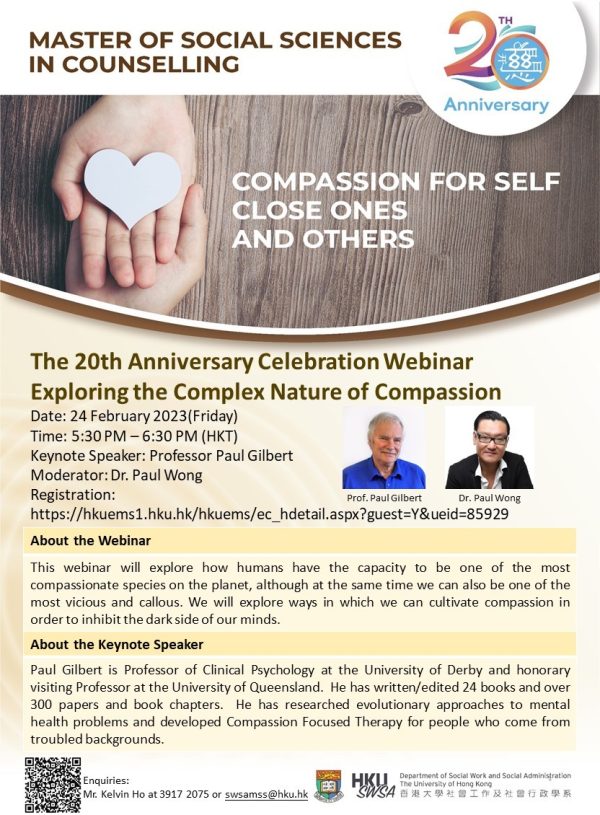
Celebration Webinar: Exploring the Complex Nature of Compassion by Prof. Paul Gilbert
Paul Gilbert is Professor of Clinical Psychology at the University of Derby and honorary visiting Professor at the University of Queensland. He has written/edited 24 books and over 300 papers and book chapters. He has researched evolutionary approaches to mental health problems and developed Compassion Focused Therapy for people who come from troubled backgrounds. This webinar will explore how humans have the capacity to be one of the most compassionate species on the planet, although at the same time we can also be one of the most vicious and callous. We will explore ways in which we can cultivate compassion in order to inhibit the dark side of our minds.
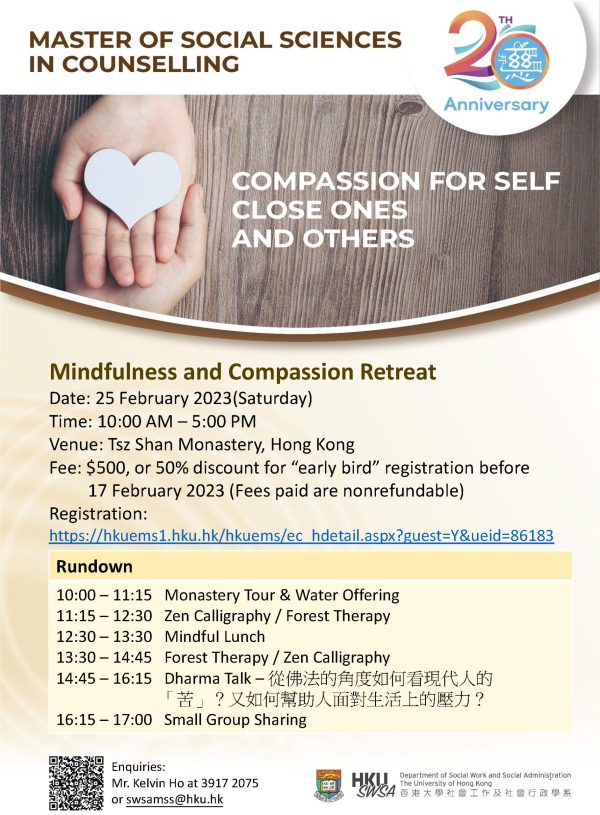
Mindfulness and Compassion Retreat to Tsz Shan Monastery
The Mindfulness and Compassion Retreat was a full-day event that took place on 25 February 2023 at the beautiful Tsz Shan Monastery in Hong Kong. The retreat aimed to help participants cultivate mindfulness and compassion through various activities and talks. The retreat started with a guided tour of the monastery and a water offering ceremony, followed by a session of Zen calligraphy and forest therapy to help participants connect with nature and find inner peace. Afterwards, participants enjoyed a mindful lunch together. In the afternoon, the retreat resumed with more forest therapy and Zen calligraphy, followed by a Dharma talk on how Buddhism can help people face the stresses and challenges of modern life. The talk was given by a respected Dharma teacher and provided valuable insights and guidance. The retreat concluded with a small group sharing session where participants discuss their experiences and insights from the day.
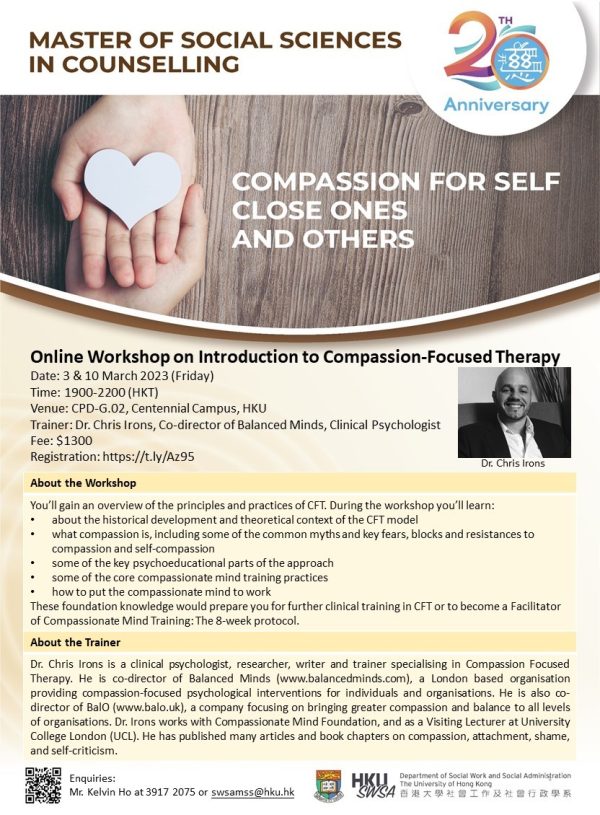
Online Workshop on Introduction to Compassion-Focus Therapy by Dr. Chris Irons
This workshop provides an overview of the principles and practices of Compassion Focused Therapy (CFT). Led by Dr. Chris Irons, a clinical psychologist, researcher, writer and trainer specializing in CFT, participants will gain foundational knowledge about the CFT model, the theoretical context and historical development of the approach, and the key psychoeducational components of the method. Participants will learn about compassion, including common myths, fears, blocks and resistances to compassion and self-compassion. They will also explore core compassionate mind training practices and learn how to put the compassionate mind to work. This workshop is a prerequisite for further clinical training in CFT or to become a Facilitator of Compassionate Mind Training: The 8-week protocol. Dr. Irons works with the Compassionate Mind Foundation and is a Visiting Lecturer at University College London (UCL). He has published numerous articles and book chapters on compassion, attachment, shame, and self-criticism. As co-director of Balanced Minds and BalO, Dr. Irons is passionate about bringing greater compassion and balance to individuals and organizations.
Candidates may apply for more than one programme. However, as the selection panel for each programme is different, you must submit separate applications along with relevant sets of supporting documents and pay the corresponding fees for each application. Please note that even if they are admitted to more than one programme, they will only be allowed to enrol in one of them.
According to the HKU General Qualifications for Admissions, concurrent registration by a student at this University for another post-secondary qualification at this University or another institution is not permitted unless approval from the Senate has been obtained in advance.
All courses are generally scheduled on weekday evenings and Saturday mornings/ afternoons.
All courses are to be taught in a face-to-face format. Online and hybrid learning modes were offered solely because of unexpected circumstances.
No. Our programme currently only offers a part-time mode of study.
Yes. Our programme currently only offers a two-year part-time mode of study.
The Hong Kong Immigration Department issues student visas to part-time students on a limited number of days only. Please refer to their website https://www.immd.gov.hk/eng/services/visas/study.html for details.
Work experience is usually an important criterion for application and a key consideration factor for the programme’s selection process. The two-year work experience mark is counted till the end of August instead of the date of the application deadline.
No, this would not be an issue as nearly half of our students come from other disciplines.
Students are expected to secure their own placement. If they fail to find one after exhausting their personal resources, placement by the department will be provided. However, please note that the choice of placement settings would be limited.
Students are required to complete a total of 250 practicum hours, 60 individual and group supervision hours and a practice-based project based on their practicum work. Each student is assigned a supervisor who will be responsible for overseeing the practicum activities performed by the students.
Different professional bodies have different criteria for various ranks of membership. Graduates of our programme are eligible for membership in some local bodies, such as The Hong Kong Professional Counselling Association (HKPCA). Regarding overseas registration, it greatly depends on the individual circumstances and the expectations posed by the professional bodies.
The skills learned can be applied to a wide range of professions and career paths, but generally, we have observed the following:
- Those who were already working in human services tend to obtain greater levels of responsibility and in some cases, a promotion upon completion of training.
- The majority who were previously not in the counselling field was able to secure paid jobs in the field, but the time taken varies from person to person.
- There are also individuals who are not seeking a paid job or change of career but seem to enjoy having an additional set of life skills and/or offering their professional counselling services as a volunteer.
Please apply at http://www.aal.hku.hk/tpg.
No. Only online application is accepted.
Candidates are not required to upload documents on the online application system.
Applicants who have been shortlisted for the admission test are required to submit TWO sets of hard copies of supporting documents including transcripts, diplomas, certificates, English language official score reports, on the date of the test. Each set of documents MUST have the applicant’s application number and full name clearly marked. Detailed submission guidelines will be provided in the invitation email for the admission tests.
Candidates are required to submit the supporting documents stated below:
Official Transcripts
(i) Final transcript for a completed degree that includes the degree conferment information
(ii) Latest available transcript for a degree that is currently in progress or has not yet been conferred
Degree Certificates
(i) Graduate certificate of undergraduate studies
(ii) Graduate certificate of Taught Postgraduate / Associate Degree / Higher Diploma programme
(Only for applicants who have also obtained Master’s degree / Associate Degree / Higher Diploma programme.)
(For applicants who have obtained a degree from universities in Mainland China)
(i) Online Verification Report of Higher Education Qualification Certificate (教育部學歷證書電子註冊備案表), in both Chinese and English versions, issued by the China Higher Education Student Information (學信網); and
(ii) Online Verification Report of Higher Education Degree Certificate (中國高等教育學位在線驗證報告), in both Chinese and English versions, issued by China Higher Education Student Information
Please set the validity period of the above-requested reports to six months or the longest available duration.
(For non-local applicants from Mainland China whose qualification were awarded by overseas universities)
(i) Overseas Credentials Evaluation Report (國外學歷學位認證書) issued by the Chinese Service Center for Scholarly Exchange (CSCSE) (教育部留學服務中心); or
(ii) Given the processing time required by CSCSE, if the Report is not yet available by the document submission deadline, an email or a text message sent by CSCSE after payment, confirming that the application of the Report has been successfully initiated. Upon receipt of the Overseas Credentials Evaluation Report, applicants should upload the document to the application system.
English Language Requirements
(i) Applicants with qualifications from universities or comparable institutions outside Hong Kong, where the language of teaching and/or examination is not English, are required to obtain valid and satisfactory results from one of the following examinations:
- TOEFL (University’s TOEFL code is 9671) / IELTS / GCE / IGCSE / Cambridge Test of Proficiency in English Language
- For the acceptance range of performance for respective examinations, please refer to the requirements of university/respective programmes.
(ii) Applicants with qualifications from universities or comparable institutions where the medium of teaching and examination is English should provide:
- An official letter or equivalent proof, such as transcript or degree certificate, confirming that the applicants’ qualifications were obtained from a university or comparable institution where the medium of instruction is English
Two referee reports sent via the online application system
Only referees with the provision of official university/company email/correspondence addresses are accepted. The University may approach referees and their affiliated university/company for verification.
Personal Statements / Curriculum vitae in English / Other relevant documents (if appropriate)
No, it is not necessary to submit transcripts for both degrees. Submitting the bachelor’s degree transcript will be sufficient.
If candidates want to provide evidence of their performance in other courses or Programmes, they can choose to submit to us as well for our review.
Two references (i.e., one about the candidate’s academic ability to pursue graduate studies at the master’s level; another on the candidate’s character, interpersonal skills and personal integrity to become a counsellor). Candidates are suggested to find two referees with different backgrounds to fulfil the above requirements.
Candidates should nominate 2 referees on the application system to support their application to the University. Please communicate with the referees and seek their consent prior to submitting the application. An email will be sent to each referee AUTOMATICALLY to seek their confidential reference after successfully submitting an application. Hence, valid information must be provided. Otherwise, the application may not be processed.
An email will be sent to each referee automatically seeking their confidential reference after they have successfully submitted the application. The referee will receive an email specifying how to log in to the Online Reference Report System. They should remind their referees to input the reference form promptly to avoid delays regarding their application.
The submission deadline of the reference form varies for each candidate. The actual time is 14 days after the referee receives the invitation email disregarding the application deadline.
The submission deadline of the reference form varies for each candidate. The actual time is 14 days after the referee receives the invitation email.
A completed personal statement is a requirement for applying to the programme. Hence, it is compulsory to fulfil this requirement as part of the application process.
Graduation certificates and/or transcripts that are not in English should be accompanied by an officially certified translation into English, normally completed by the Registry of the awarding institution and/or the High Court/Lawyer.
The purposes of the selection procedures are threefold:
- To assess the candidate’s communication skills (oral and written) and their attitudes/ expectations towards studying a postgraduate counselling course;
- To understand candidate’s readiness/ abilities to pursue the study, in particular, their time management skills, ability to cope with stress and competing life roles and lastly;
- Provide an opportunity for candidates to raise any questions regarding the counselling programme at The University of Hong Kong.
The written test lasts for 1 hour. Candidates are required to answer two essay-type questions in English:
- “Personal Experience” and
- Issues related to the “Code of Ethics” of being counsellors in Hong Kong.
(Should they wish to know more information about the “Code of Ethics”, please refer to the following link: https://www.hkpca.org.hk/about/code-of-ethics/)
The group interview lasts for 45-minutes. Candidates are advised to prepare themselves by:
- Reading the student handbook carefully,
- Engaging in life planning,
- Taking a course on counselling on an open-learning platform, e.g. EdX, Coursera
- Seeking support from social networks
Online admission tests and interviews are applicable only to candidates not residing in Hong Kong. Candidates in Hong Kong are required to attend both sessions face-to-face on the HKU Campus.
No. Places are offered on a first-come-first-serve basis. Due to keen competition, potential candidates are strongly encouraged to apply earlier.
The Department will contact candidates around mid-December (Round 1) and mid-April (Round 2) to make a provisional offer via email for those who are successful in their applications. Once the email has been received, please reply as soon as possible whether you accept the offer or not. The final and official offer from the Faculty Office will be made in January (Round 1) and May (Round 2), respectively.
Prof. Paul W.C. Wong
Programme Director
- paulw@hku.hk
Programme Enquiry
- swsamss@hku.hk
- (852) 3917 2075

